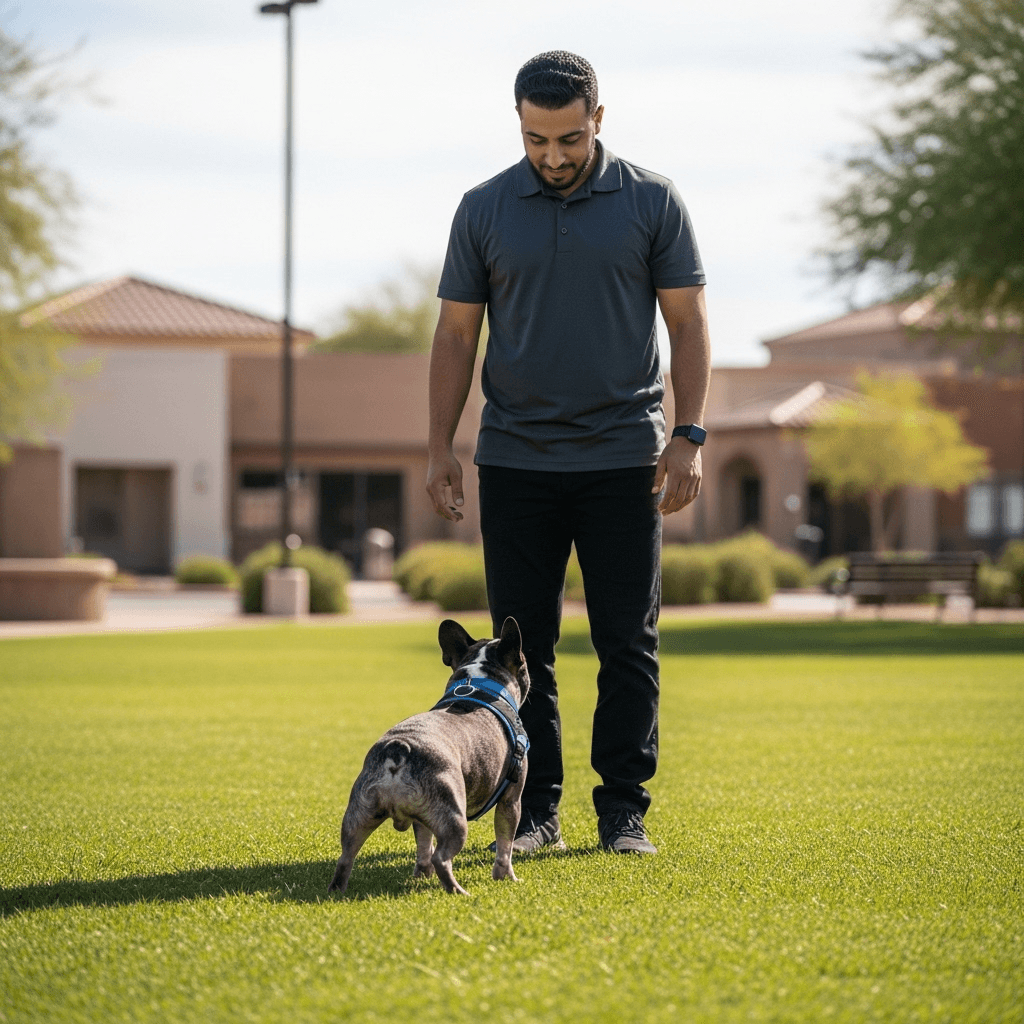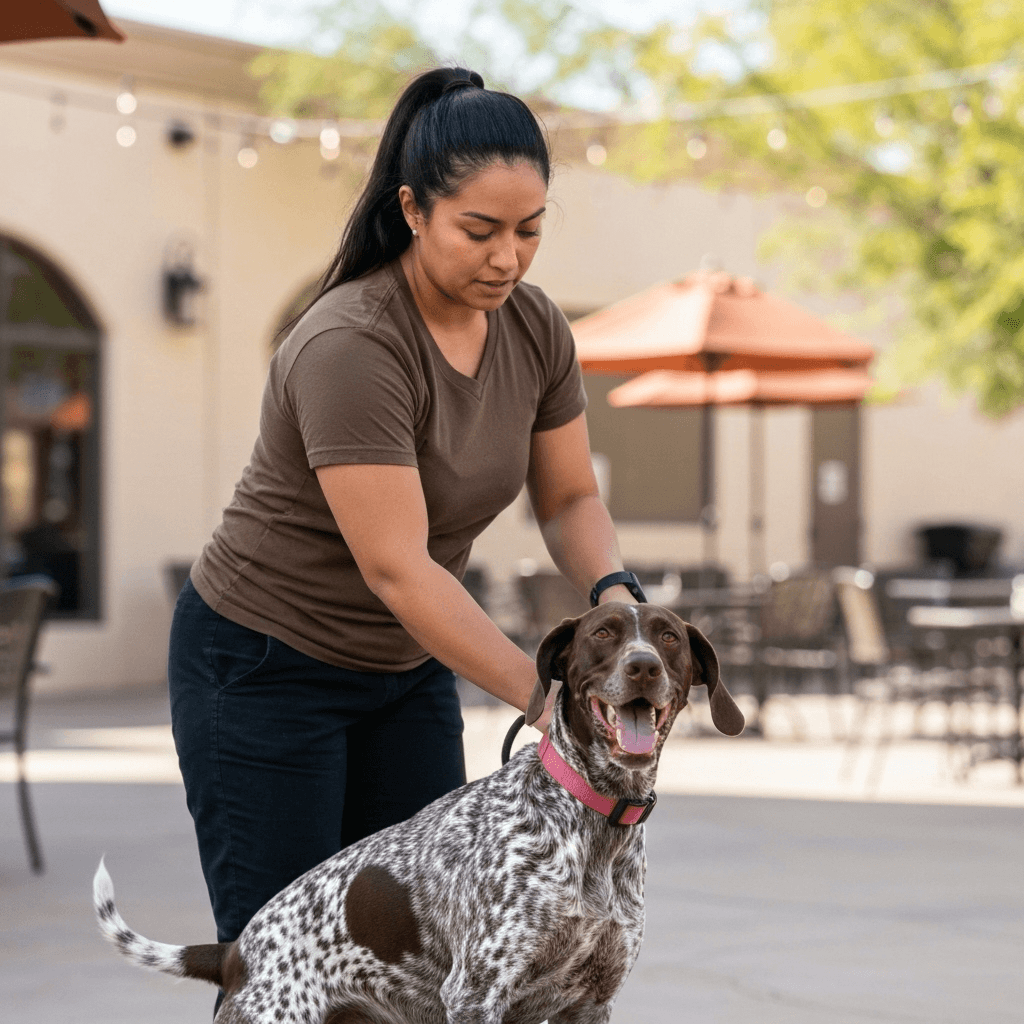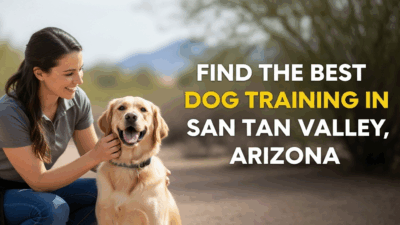Your Complete Guide to Choosing a Dog Trainer in San Tan Valley AZ and Surrounding Areas
Living with a dog in San Tan Valley means navigating desert-adapted landscapes, wide-open residential streets, and a growing community that values outdoor spaces. Your dog needs to handle everything from leash walks through the heat-reflecting neighborhoods to staying calm when golfers pass by at nearby courses or when encountering desert wildlife on morning walks.
San Tan Valley sits in Pinal County, which means you’ll follow county and state regulations for licensing, vaccinations, and public behavior. When you find a trainer who understands these local challenges, you’ll get better results both at home and throughout the community.
How to Choose the Right Trainer
Start by looking for someone who uses positive reinforcement training and can set realistic goals for your San Tan Valley lifestyle. This means your dog should learn to walk calmly on residential streets, stay focused near busy shopping areas like the San Tan Village plaza, and handle new environments without stress.
Credentials give you a quick way to compare trainers’ experience levels. Common dog trainer certifications include KPA-CTP, CPDT-KA, or IAABC-CDBC for behavior problems. If your dog has serious aggression issues, look for someone with CBCC-KA or a science-based program like CTC.
In-home dog training works great for puppy manners, door greetings, and neighborhood leash skills. Group classes make sense once your dog can focus around other dogs, especially before you try busier spots in Queen Creek or Gilbert.
Common Dog Training Methods Explained

Reward-based methods build the trust you want while creating lasting behavior changes. They also help you follow Pinal County’s rules about keeping dogs under control in public.
Basic obedience covers sit, down, stay, place, recall, and leash training so your dog can handle walks, outdoor dining spots, and park visits without pulling or jumping on people. These skills become especially important during Arizona’s cooler months when more residents are outside enjoying their yards and community spaces.
Puppy training focuses on socialization, potty training, bite control, crate comfort, and early leash work. Starting with short, positive training sessions prevents bad habits from forming in the first place.
Behavior modification addresses fear, reactivity, resource guarding, or separation anxiety through careful desensitization and counterconditioning. For serious cases, ask if your trainer works with local veterinarians in the San Tan Valley or Queen Creek area.
Private lessons and in-home services let you customize everything around your daily routines, while board and train programs can speed up results when you’re short on time. Day training offers a middle option where professional dog trainers work with your dog during the day and teach you how to maintain progress.
Dog training classes help your dog practice good manners around other dogs and people. The best classes give dogs plenty of space, screen participants carefully, and teach calm behavior rather than just excitement.
Specialized training programs like therapy dog training or service dog training require extra structure, public-access skills, and a very clear step-by-step training program.
Stay away from trainers who use fear, intimidation, or pain to get results. Humane methods are safer for everyone, easier to maintain long-term, and much better for keeping peace with your neighbors in close-knit San Tan Valley communities.
Average Cost of Dog Training in San Tan Valley AZ and Surrounding Areas (Updated for 2025)
Prices around San Tan Valley and Pinal County depend on the trainer’s experience, how long sessions last, and where the training happens. Here’s what most local pet owners are paying in 2025.
| Service Type | Average Cost (San Tan Valley/Pinal County) |
|---|---|
| Puppy classes (4–6 weeks) | $140–$260 total |
| Group obedience training (4–6 weeks) | $150–$285 total |
| Private lessons (60–90 min) | $100–$180 per session |
| In-home coaching packages (4–6 visits) | $400–$850 total |
| Board and train (2–4 weeks) | $1,800–$4,200 total |
| Behavior consult for reactivity/anxiety (initial) | $140–$240 |
| Day training (trainer works your dog + handoff) | $425–$900 per week |
You’ll probably pay extra travel fees for longer distances within Pinal County or if trainers come from nearby Gilbert or Chandler. Expect higher rates for complex behavior work involving aggression or severe separation anxiety.
Make sure you understand what’s included, how the trainer tracks progress, and whether they offer a free consultation or free evaluation before you sign up.
Questions to Ask a Potential Dog Trainer
- What training methods do you use, and how do you keep sessions positive and low-stress?
- What credentials do you have, like KPA-CTP or CPDT-KA? Do you keep up with continuing education such as CPDT-KSA?
- How will you customize the training plan for my dog’s specific needs and our San Tan Valley lifestyle?
- Do you offer in-home visits, group classes, or day training, and which approach fits my goals best?
- How will we measure my dog’s progress and know when to add more distractions?
- What are the total costs, including any travel fees, and what’s your cancellation policy?
- Do you carry liability insurance, and can you show me proof?
- For behavior problems, will you work with my veterinarian if needed?
- What should I practice between our training sessions to help my dog keep improving?
- How do you handle desert-specific challenges like heat awareness, wildlife encounters, and dust storms?
Local San Tan Valley and Pinal County Rules and Considerations
San Tan Valley follows Pinal County regulations for animal control, licensing, and public safety. Understanding these rules helps you train for real-world scenarios while staying compliant.
Pinal County requires all dogs over four months old to be licensed annually. You’ll need proof of current rabies vaccination to get your license through Pinal County Animal Care and Control.
Arizona law requires rabies vaccination for all dogs, and your dog must wear the current rabies tag when in public. You can get vaccinations through your regular vet or low-cost clinics offered periodically by the county.
Leash laws in Pinal County require dogs to be on leash or under direct control in public areas. This includes streets, sidewalks, parks, and trails throughout San Tan Valley.
Barking ordinances address excessive noise that disturbs neighbors. Work with your trainer on alert barking and separation anxiety before issues escalate, especially in closely spaced residential areas.
Arizona doesn’t require special licenses for dog trainers, but any business offering boarding services must comply with state regulations. If a certified dog trainer wants to use public parks for commercial dog training services, they may need permits and proof of liability insurance.
Desert wildlife presents unique training challenges in San Tan Valley. Teach your dog reliable recall and strong “leave it” cues to handle encounters with coyotes, javelina, roadrunners, and rattlesnakes safely.
Local San Tan Valley Resources for Dog Owners
These spots give you great places to practice polite manners, work on recalls, and provide safe enrichment for training your dog. Always follow posted rules and etiquette guidelines.
- San Tan Regional Park offers 10,000 acres with trails where leashed dogs are welcome, giving you excellent opportunities to practice obedience training around wildlife and other hikers
- Skyline Regional Park in nearby Queen Creek welcomes leashed dogs on trails and provides varied terrain for building focus and endurance
- Schnepf Farms Dog Park in Queen Creek offers a fenced area for off-leash practice once your dog has reliable recall and good social skills

FAQs
How much does in-home dog training cost?
Most San Tan Valley trainers charge $100–$180 per in-home visit, with discounts available when you buy packages. Behavior problems typically start at the higher end of that range.
Is in-home dog training worth it?
Absolutely, because you’re working on problems exactly where they happen. Your trainer can fix door manners, jumping on guests, counter-surfing, and yard reactivity right at home, then step outside to practice leash skills on your actual neighborhood sidewalks where you encounter delivery drivers, neighbors walking, and desert wildlife.
Can you pay someone to house train your dog?
Yes, many expert dog trainers offer puppy programs that include potty training, crate routines, and daily schedules. Day training can speed up the process while teaching you how to maintain the progress.
What is the 3-3-3 rule for dog training?
This is a helpful timeline for new or adopted dogs: expect about 3 days for your dog to decompress, 3 weeks to learn your routines, and 3 months to feel completely settled. Good training programs work with this natural adjustment period.
How long will it take to reach my training goals?
Most puppies and friendly adult dogs show solid progress within 4–8 weeks if you practice daily. Fear, reactivity, or aggression typically requires several months of careful behavior modification with gradual increases in difficulty.
What should I bring to group classes?
Pack a flat collar or harness, a 6-foot leash, high-value treats, water, and current vaccination records if your trainer requests them. Leave retractable leashes at home for safety reasons.
What’s the leash law in San Tan Valley?
Pinal County requires dogs to be on leash or under direct control in all public areas, except inside designated off-leash dog parks. Keep that 6-foot leash handy for neighborhood walks, shopping areas, and community trails.
Do I need a dog license in San Tan Valley or Pinal County?
Yes, Pinal County requires annual dog licenses for all dogs over four months old. You’ll need current rabies vaccination records to get your license through Pinal County Animal Care and Control.
What shots does my dog need in Pinal County or Arizona?
Arizona law requires rabies vaccination for all dogs. Your veterinarian may also recommend distemper-parvo, bordetella, and leptospirosis based on your dog’s lifestyle and exposure risks.
Are dog trainers required to be licensed in San Tan Valley or Pinal County or Arizona?
No special trainer licenses exist in Arizona. Trainers follow normal business regulations, but if they offer boarding services as part of board and train programs, their facility may need to comply with state animal care facility regulations.
Where can I practice off-leash recall?
Use fenced dog parks like Schnepf Farms Dog Park in Queen Creek to keep things safe and legal. Try visiting during quieter hours when you’re starting out with a well-behaved dog.
Which dog parks allow training around San Tan Valley?
Schnepf Farms Dog Park in nearby Queen Creek offers fenced areas where you can practice recall and socialization. Always check current park rules and hours before visiting.
What trails allow dogs for training?
San Tan Regional Park welcomes leashed dogs on all trails, providing perfect opportunities to help your dog build focus around desert wildlife, mountain bikers, and other hikers. Skyline Regional Park in Queen Creek is another solid option for obedience training in varied terrain.
How do I train my dog to avoid rattlesnakes?
Look for professional dog trainers who offer rattlesnake avoidance training, which is especially important in San Tan Valley where rattlesnakes are common from March through October. These specialized training sessions use safe, controlled exposure to teach dogs to avoid the sight, sound, and smell of rattlesnakes.
What if my dog is reactive to desert wildlife?
Work with a trainer experienced in behavior modification to help your dog stay calm around jackrabbits, coyotes, and birds. Start training indoors, gradually add distance-based exposure during controlled walks, and always keep your dog on leash in areas where wildlife is present.
Should I train my dog to tolerate extreme heat?
Focus on teaching your dog to walk calmly during cooler morning and evening hours rather than conditioning them to handle midday heat. Professional trainers in San Tan Valley understand the importance of heat safety and will schedule outdoor training sessions accordingly.
The right combination of thoughtful planning, humane methods, and consistent practice around San Tan Valley’s neighborhoods and desert landscapes will help your dog become a confident, well-behaved companion. If credentials matter to you, don’t hesitate to ask about dog trainer certifications and how your trainer stays current with new techniques.
